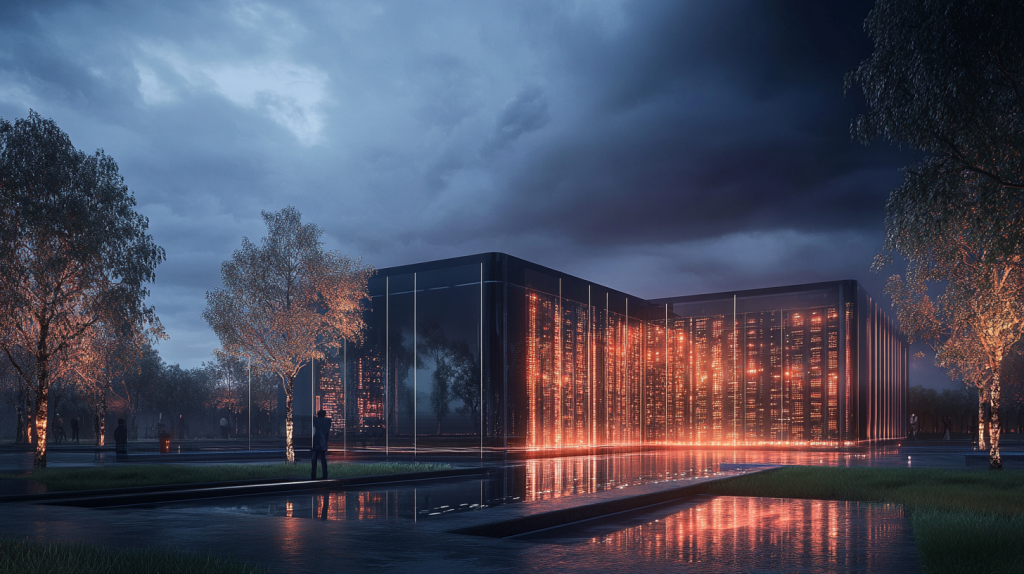Data Center Construction Compliance: Top Tools for Streamlining Permits and Compliance in Data Center Construction
Table of Contents:

Building a data center is not just about pouring concrete, installing servers, and flipping the switch—it’s about navigating a maze of permits, inspections, and compliance regulations before the first kilowatt of power flows. In an industry where speed to market is everything, delays caused by compliance issues can lead to cost overruns, regulatory fines, and frustrated stakeholders.
The challenge? Data center construction is subject to a web of local, national, and industry-specific regulations, from environmental impact assessments to electrical and fire safety codes. Keeping up with ever-changing laws, securing permits on time, and passing inspections without delays requires a streamlined compliance strategy and the right tools.
In this guide, we’ll explore the best tools and strategies for simplifying permits, inspections, and compliance management in data center construction, helping project managers keep everything on track and fully compliant.
Why Compliance is Critical in Data Center Construction
If data centers are the backbone of the digital world, compliance is the glue that holds everything together. Without proper permits and regulatory approvals, even the most advanced hyperscale data center is just an expensive warehouse full of unused equipment.
Regulatory requirements vary by location, project scope, and industry standards, including:
- Zoning and Land Use Permits – Determines whether a data center can be built on a specific site.
- Environmental Regulations – Ensures compliance with energy efficiency, carbon emissions, and water usage policies.
- Electrical & Fire Safety Codes – Protects against potential hazards and ensures operational continuity.
Failing to address compliance early can lead to construction delays, penalties, and project redesigns. That’s why using compliance tracking tools and automated permit management platforms is crucial for keeping everything organized and legally sound.
Key Benefits
- Prevents unexpected regulatory delays.
- Ensures compliance with local, national, and industry-specific laws.
- Reduces the risk of fines, shutdowns, or project redesigns.
Best Practices
- Conduct pre-construction compliance audits to identify potential risks.
- Use digital permit tracking tools to streamline approvals.
- Align construction timelines with permit approval processes.
Compliance is not just a box to check—it’s a strategic necessity that determines how quickly and smoothly a data center project moves forward.

Top Digital Tools for Managing Permits and Inspections
Gone are the days of stacks of paperwork and frantic calls to city inspectors. Modern data center projects use digital platforms to track permits, schedule inspections, and manage compliance documentation in one place.
Leading compliance tools include:
- Procore – A cloud-based platform for permit tracking and inspection management.
- PlanGrid – Helps construction teams maintain up-to-date compliance records and access regulations on-site.
- StruxHub Compliance – Offers real-time tracking of permits, approvals, and regulatory checklists to keep projects on schedule.
Key Benefits
- Centralizes compliance documentation in a single, easily accessible platform.
- Reduces permit approval delays with automated reminders and tracking.
- Improves communication between construction teams, inspectors, and local authorities.
Best Practices
- Integrate compliance software with project scheduling tools.
- Assign a compliance manager to oversee permits and inspections.
- Automate compliance reporting for faster approvals.
Using digital tools to manage permits and inspections ensures that compliance is never an afterthought, keeping data center construction on track and legally sound.
Related Articles:
Best Guide to Data Center Construction Management Software: Manage Scheduling, Deliveries, and Compliance for Hyperscale Projects
Data Center Construction Deliveries: Best Real-Time Tracking Solutions for Managing Data Center Construction Deliveries
Data Center Construction: Top Delivery and Scheduling Strategies for Redundant Power Systems in Data Centers
Ensuring Environmental and Energy Compliance for Data Centers
Data centers are massive consumers of power and water, making them subject to strict environmental regulations. From carbon emissions limits to sustainable cooling requirements, failing to comply with green building laws can result in fines, legal battles, and reputational damage.
Regulations such as:
- ASHRAE 90.4 – Governs energy efficiency standards for data center design.
- LEED (Leadership in Energy and Environmental Design) – Incentivizes sustainable construction practices.
- EPA Regulations – Controls cooling water discharge and emissions from backup generators.
To stay compliant, project teams must track and report environmental impact data throughout construction. Using tools like Arc Skoru and StruxHub Compliance, teams can automate energy efficiency tracking and ensure real-time compliance with evolving environmental laws.
Key Benefits
- Prevents regulatory violations related to energy consumption and emissions.
- Supports sustainability initiatives for lower operational costs.
- Improves eligibility for LEED certification and energy rebates.
Best Practices
- Integrate automated energy reporting tools into compliance workflows.
- Conduct environmental impact assessments early in the project.
- Use AI-powered efficiency modeling to reduce power and water consumption.
Environmental compliance isn’t just a regulatory hurdle—it’s a long-term strategy for cost reduction, sustainability, and operational efficiency.
Managing Fire and Electrical Safety Permits
When it comes to data center construction, fire and electrical safety are non-negotiable. Given the high energy loads, dense server racks, and extensive cabling, the risk of electrical fires, power surges, and overheating is a major concern. That’s why fire and electrical permits are among the most scrutinized aspects of compliance.
Without proper permits and inspections, a data center risks failing final commissioning, leading to costly rework, delayed operations, and potential shutdown orders from local authorities. Common fire and electrical compliance requirements include:
- NFPA 75 & NFPA 76 – Fire protection standards specifically for IT equipment.
- NEC (National Electrical Code) – Ensures proper electrical system design and grounding.
- IEEE 3001.2 – Covers electrical reliability in commercial and industrial buildings, including data centers.
To streamline permit approvals and inspections, construction teams should use automated compliance tracking tools that monitor fire suppression systems, emergency power shutdown protocols, and electrical load balancing in real-time. Platforms like StruxHub Compliance allow teams to digitally submit permit applications, track approvals, and document inspections to avoid delays.
Key Benefits
- Ensures fire and electrical systems meet safety codes before data center commissioning.
- Reduces permit approval delays by automating compliance documentation.
- Prevents expensive rework and regulatory penalties.
Best Practices
- Conduct early fire risk assessments to ensure permit applications are accurate.
- Use compliance tracking software to monitor inspection statuses.
- Train project teams on electrical safety codes to reduce errors during installation.
By proactively managing fire and electrical safety permits, data center teams can avoid costly compliance setbacks and ensure a smooth transition to operations.
Related Articles:
Hyperscale Data Center Construction: How to Simplify Multi-Tier Scheduling for Hyperscale Data Center Construction
Data Center Construction Scheduling: Best Workforce Scheduling Strategies to Improve Productivity in Data Center Construction

Overcoming Zoning and Land Use Challenges
Before breaking ground on a new data center, developers must navigate zoning laws, land use permits, and local regulatory approvals. Unlike standard commercial buildings, data centers require large-scale electrical infrastructure, cooling systems, and backup power generation, which can conflict with local zoning restrictions.
Common land use challenges include:
- Noise restrictions – Due to large generators and cooling systems.
- Energy use limitations – Some regions limit how much grid power a facility can draw.
- Building height and footprint regulations – Local laws may restrict how much land a facility can occupy.
To avoid costly project delays, developers should engage with local zoning officials early, ensuring that plans meet all permitting requirements before land acquisition. Additionally, by using geospatial planning tools, teams can assess environmental impact, access utility connections, and predict community concerns before applying for permits.
Key Benefits
- Reduces unexpected land use restrictions and project redesigns.
- Ensures compliance with noise, energy, and infrastructure regulations.
- Speeds up zoning approvals by aligning early with municipal planning.
Best Practices
- Conduct pre-construction zoning reviews with local authorities.
- Use geospatial analysis tools to assess site feasibility.
- Engage in community outreach to prevent project opposition.
Proactively managing zoning and land use compliance ensures that data center projects don’t get stuck in regulatory red tape.
Navigating International Compliance for Global Data Center Projects
Expanding hyperscale data centers across multiple countries brings a new layer of compliance complexity. International projects must adhere to local construction laws, environmental policies, and energy regulations, all while maintaining global corporate standards.
Key challenges in international compliance include:
- Varying Electrical Codes – The U.S., Europe, and Asia all have different electrical safety requirements.
- Energy Efficiency Regulations – Some countries have stricter carbon footprint and renewable energy requirements.
- Workforce Compliance – Labor laws differ across regions, affecting shift scheduling, union requirements, and worker safety.
To streamline global compliance, project managers should use multi-country permit tracking platforms that consolidate permits, safety regulations, and energy requirements in one place. Tools like StruxHub Compliance help construction teams standardize compliance workflows across international borders while ensuring local regulatory alignment.
Key Benefits
- Reduces legal risks and regulatory delays in new markets.
- Ensures global consistency while meeting local compliance laws.
- Simplifies multi-country project management with unified compliance tracking.
Best Practices
- Hire local compliance experts for regulatory guidance.
- Use international permit tracking software to centralize documentation.
- Adapt energy and environmental strategies to meet local standards.
By taking a proactive approach to international compliance, global data center projects can avoid regulatory setbacks and expand operations smoothly.
Related Articles:
Best Guide to Construction Management Software
Data Center Construction Delivery Coordination: Efficient Scheduling Strategies for Modular Data Center Equipment Installations
The Best Guide to Delivery Management Systems (DMS) for Commercial Construction
Superintendents: Effective Training Strategies for Construction Management Software Users

Managing Fire and Electrical Safety Permits
When it comes to data center construction, fire and electrical safety are non-negotiable. Given the high energy loads, dense server racks, and extensive cabling, the risk of electrical fires, power surges, and overheating is a major concern. That’s why fire and electrical permits are among the most scrutinized aspects of compliance.
Without proper permits and inspections, a data center risks failing final commissioning, leading to costly rework, delayed operations, and potential shutdown orders from local authorities. Common fire and electrical compliance requirements include:
- NFPA 75 & NFPA 76 – Fire protection standards specifically for IT equipment.
- NEC (National Electrical Code) – Ensures proper electrical system design and grounding.
- IEEE 3001.2 – Covers electrical reliability in commercial and industrial buildings, including data centers.
To streamline permit approvals and inspections, construction teams should use automated compliance tracking tools that monitor fire suppression systems, emergency power shutdown protocols, and electrical load balancing in real-time. Platforms like StruxHub Compliance allow teams to digitally submit permit applications, track approvals, and document inspections to avoid delays.
Key Benefits
- Ensures fire and electrical systems meet safety codes before data center commissioning.
- Reduces permit approval delays by automating compliance documentation.
- Prevents expensive rework and regulatory penalties.
Best Practices
- Conduct early fire risk assessments to ensure permit applications are accurate.
- Use compliance tracking software to monitor inspection statuses.
- Train project teams on electrical safety codes to reduce errors during installation.
By proactively managing fire and electrical safety permits, data center teams can avoid costly compliance setbacks and ensure a smooth transition to operations.
Overcoming Zoning and Land Use Challenges
Before breaking ground on a new data center, developers must navigate zoning laws, land use permits, and local regulatory approvals. Unlike standard commercial buildings, data centers require large-scale electrical infrastructure, cooling systems, and backup power generation, which can conflict with local zoning restrictions.
Common land use challenges include:
- Noise restrictions – Due to large generators and cooling systems.
- Energy use limitations – Some regions limit how much grid power a facility can draw.
- Building height and footprint regulations – Local laws may restrict how much land a facility can occupy.
To avoid costly project delays, developers should engage with local zoning officials early, ensuring that plans meet all permitting requirements before land acquisition. Additionally, by using geospatial planning tools, teams can assess environmental impact, access utility connections, and predict community concerns before applying for permits.
Key Benefits
- Reduces unexpected land use restrictions and project redesigns.
- Ensures compliance with noise, energy, and infrastructure regulations.
- Speeds up zoning approvals by aligning early with municipal planning.
Best Practices
- Conduct pre-construction zoning reviews with local authorities.
- Use geospatial analysis tools to assess site feasibility.
- Engage in community outreach to prevent project opposition.
Proactively managing zoning and land use compliance ensures that data center projects don’t get stuck in regulatory red tape.
Navigating International Compliance for Global Data Center Projects
Expanding hyperscale data centers across multiple countries brings a new layer of compliance complexity. International projects must adhere to local construction laws, environmental policies, and energy regulations, all while maintaining global corporate standards.
Key challenges in international compliance include:
- Varying Electrical Codes – The U.S., Europe, and Asia all have different electrical safety requirements.
- Energy Efficiency Regulations – Some countries have stricter carbon footprint and renewable energy requirements.
- Workforce Compliance – Labor laws differ across regions, affecting shift scheduling, union requirements, and worker safety.
To streamline global compliance, project managers should use multi-country permit tracking platforms that consolidate permits, safety regulations, and energy requirements in one place. Tools like StruxHub Compliance help construction teams standardize compliance workflows across international borders while ensuring local regulatory alignment.
Key Benefits
- Reduces legal risks and regulatory delays in new markets.
- Ensures global consistency while meeting local compliance laws.
- Simplifies multi-country project management with unified compliance tracking.
Best Practices
- Hire local compliance experts for regulatory guidance.
- Use international permit tracking software to centralize documentation.
- Adapt energy and environmental strategies to meet local standards.
By taking a proactive approach to international compliance, global data center projects can avoid regulatory setbacks and expand operations smoothly.

Using AI for Real-Time Compliance Monitoring
Keeping up with permits, inspections, and evolving compliance laws in real-time is nearly impossible without automation. That’s why AI-powered compliance tools are becoming a game-changer in data center construction.
AI-driven compliance platforms analyze project data, flag potential violations, and suggest corrective actions before they become legal issues. Instead of waiting for manual inspections, AI monitors fire suppression systems, emissions levels, and electrical safety metrics 24/7, ensuring that everything remains compliant throughout the construction process.
By integrating AI-powered compliance tracking into construction workflows, project managers can automate reporting, reduce manual documentation efforts, and stay ahead of potential regulatory challenges. StruxHub Compliance leverages AI to monitor permit statuses, generate real-time alerts, and provide compliance analytics for seamless project oversight.
Key Benefits
- Prevents compliance violations by detecting issues early.
- Automates compliance reporting to reduce manual workloads.
- Ensures permits, safety protocols, and inspections stay up-to-date.
Best Practices
- Integrate AI-powered compliance tools into project management workflows.
- Use automated reporting systems to streamline regulatory filings.
- Implement machine learning analytics to predict compliance risks.
AI-powered compliance monitoring helps data center projects stay ahead of regulatory requirements, reducing the risk of unexpected fines, shutdowns, or project delays.
Unlock the Full Potential of Your Construction Projects with StruxHub
StruxHub enhances efficiency and coordination across all project phases, providing a single source of truth that eliminates silos and fosters collaboration. Real-time updates, financial management tools, and seamless commvunication features ensure that all team members and stakeholders are aligned and informed, reducing the risk of errors and delays. With comprehensive solutions for document management, risk mitigation, and quality control, StruxHub maintains project integrity and safety, while mobile access and integration capabilities further enhance project flexibility and efficiency.
StruxHub’s Key Features and Benefits:
- Advanced Delivery Management: Automate and optimize your delivery schedules, ensuring materials arrive just in time, every time.
- Site Communication: Utilize georeferenced maps and instant messaging to keep every team member informed and aligned.
- Construction Materials Management: Track inventory levels and manage materials procurement with ease, reducing waste and avoiding project delays.
- Construction Safety & Inspection Workflows: Implement customizable mobile forms for conducting safety inspections and managing compliance documentation effortlessly.
- Short-Term Scheduling: Visualize project tasks with detailed floor plans, linking each activity to specific locations for better planning accuracy.
- Construction Resource Management: Efficiently allocate personnel and equipment, maximizing productivity and reducing idle time.
StruxHub’s Product Offering:
- StruxHub Deliveries: Simplifies the coordination of incoming deliveries, ensuring materials and equipment are precisely timed to project needs.
- StruxHub Logistics: Offers intelligent site logistics planning, from crane scheduling to space allocation, for smoother operations.
- StruxHub Safety: Elevates on-site safety standards with easy-to-use tools for inspections, permits, and incident reporting.
- StruxHub Scheduling: Enhances project timelines with intuitive scheduling tools that ensure tasks are completed efficiently and on time.
With StruxHub, construction companies can look forward to a streamlined, more efficient project execution that delivers on time and within budget. Embrace the power of innovation and take your construction projects to the next level.
Don’t miss out on the opportunity to optimize your construction management processes with StruxHub. Sign up for a free demo today. Let’s build smarter, together.

StruxHub
Experience the power of StruxHub today and witness firsthand how it can revolutionize your construction operations.
FAQ
1. What are the biggest compliance challenges in data center construction?
Data center construction faces complex compliance challenges including permitting delays, evolving energy regulations, zoning laws, and environmental restrictions. Managing multiple permits and inspections across different regulatory agencies requires careful tracking and coordination.
Using compliance management platforms helps project teams automate regulatory workflows, monitor deadlines, and prevent permit delays.
2. How can digital tools improve permit tracking and approvals?
Digital compliance tools centralize permit applications, inspection tracking, and regulatory filings, eliminating the need for manual spreadsheets and paper-based submissions.
Platforms like StruxHub Compliance offer real-time permit tracking, automated reminders, and compliance reporting, ensuring that construction teams never miss a deadline or inspection requirement.
3. Why is environmental compliance critical for data center projects?
With high energy demands and large cooling requirements, data centers are heavily regulated for carbon emissions, water usage, and energy efficiency. Meeting ASHRAE 90.4, LEED certification, and EPA guidelines ensures that facilities remain environmentally responsible and operationally cost-effective.
Automating energy compliance tracking helps teams maintain real-time efficiency benchmarks while avoiding regulatory penalties.
4. What role does AI play in automating construction compliance?
AI-driven compliance monitoring detects potential violations before they become issues, automating permit tracking, fire safety audits, and emissions reporting. AI reduces manual compliance efforts, improves inspection accuracy, and minimizes human error.
5. How do international compliance requirements affect global data center projects?
Each country has different building codes, labor laws, and energy efficiency standards, requiring adaptive compliance strategies. Using multi-country permit tracking platforms simplifies global expansion, ensuring compliance across multiple regions.




